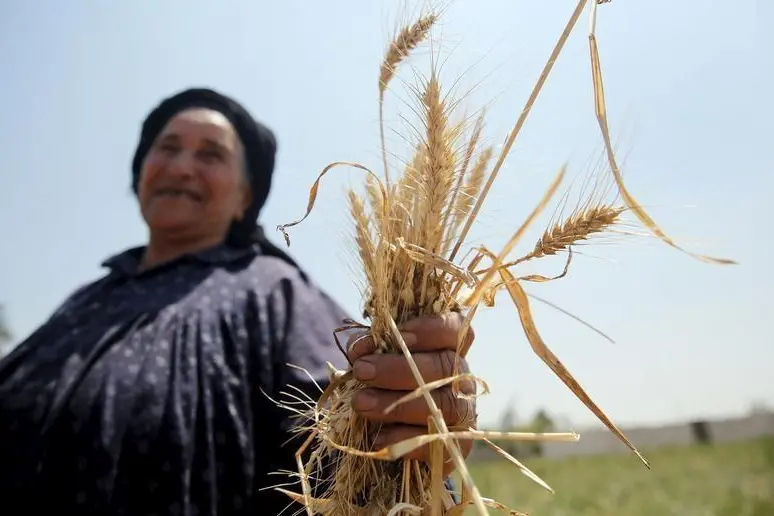PHOTO
* Decision to return to zero tolerance shocks suppliers
* Ministry says ban will be implemented retroactively
* FAO report did not consider Egypt's climate, official says
(Adds quotes, recasts)
By Eric Knecht and Maha El Dahan
CAIRO/ABU DHABI, Aug 28 (Reuters) - Egypt reinstated on Sunday a controversial ban on wheat shipments containing even the slightest amount of a common grain fungus, baffling traders who had returned to the Egyptian market just last month when the ban was lifted.
The world's largest wheat importer said on Sunday it was re-introducing its zero tolerance policy on ergot - which can lead to hallucinations in large quantities but is considered harmless at minor levels - and would apply the decision retroactively.
"The ban will be applied to every grain of wheat entering the country. As of now no infected wheat will enter either from upcoming tenders or previous ones," agriculture ministry spokesman Eid Hawash said, giving no reason for the decision.
Just last month, Egypt said it would accept imported wheat shipments containing 0.05 percent, a common international standard, of ergot in imports, settling a dispute with suppliers that had hampered the country's massive purchasing programme.
urn:newsml:reuters.com:*:nL8N19Q3HM
A Food and Agriculture Organization (FAO) risk assessment conducted earlier this year concluded that ergot posed no threat to Egyptian crops, but the agriculture ministry said at the time it would reinstate zero tolerance if future studies showed ergot affecting crops.
urn:newsml:reuters.com:*:nL8N19Z1GL
On Sunday, the head of the country's plant pathology centre told Reuters a follow-up study found that ergot did pose a risk to crops if it entered the country, and that the FAO report had not taken into consideration the different strands of ergot and Egypt's hot climate.
"There are 15 countries with ergot but we won't stop dealing with them entirely we will just make sure that when wheat is imported from these countries it comes from areas of those countries free of ergot," Ashraf Khalil said.
The July decision resulted in larger numbers of suppliers participating in General Authority for Supply Commodities' (GASC) state tenders.
urn:newsml:reuters.com:*:nL8N19Q3HM
But Sunday's reversal means suppliers risk having cargoes of previously agreed shipments rejected and that Egypt may face a renewed boycott of state grain tenders and raised prices. The move could hinder state grain importer GASC from making purchases needed to fill the country's large supply gap.
Suppliers have long maintained that guaranteeing zero ergot is nearly impossible. Some told Reuters they would likely not participate in tenders following Sunday's decision.
"It's going to be a disaster," one Cairo-based trader said.
The General Authority for Supply Commodities (GASC), which is in favour of the international 0.05 percent standard, was not immediately available for comment.
(Reporting by Eric Knecht and Maha El Dahan; additional reporting by Ehab Farouk; editing by Susan Thomas) ((Maha.Dahan@thomsonreuters.com; + 9712 4082101; Reuters Messaging: maha.dahan.thomsonreuters.com@reuters.net))
* Ministry says ban will be implemented retroactively
* FAO report did not consider Egypt's climate, official says
(Adds quotes, recasts)
By Eric Knecht and Maha El Dahan
CAIRO/ABU DHABI, Aug 28 (Reuters) - Egypt reinstated on Sunday a controversial ban on wheat shipments containing even the slightest amount of a common grain fungus, baffling traders who had returned to the Egyptian market just last month when the ban was lifted.
The world's largest wheat importer said on Sunday it was re-introducing its zero tolerance policy on ergot - which can lead to hallucinations in large quantities but is considered harmless at minor levels - and would apply the decision retroactively.
"The ban will be applied to every grain of wheat entering the country. As of now no infected wheat will enter either from upcoming tenders or previous ones," agriculture ministry spokesman Eid Hawash said, giving no reason for the decision.
Just last month, Egypt said it would accept imported wheat shipments containing 0.05 percent, a common international standard, of ergot in imports, settling a dispute with suppliers that had hampered the country's massive purchasing programme.
A Food and Agriculture Organization (FAO) risk assessment conducted earlier this year concluded that ergot posed no threat to Egyptian crops, but the agriculture ministry said at the time it would reinstate zero tolerance if future studies showed ergot affecting crops.
On Sunday, the head of the country's plant pathology centre told Reuters a follow-up study found that ergot did pose a risk to crops if it entered the country, and that the FAO report had not taken into consideration the different strands of ergot and Egypt's hot climate.
"There are 15 countries with ergot but we won't stop dealing with them entirely we will just make sure that when wheat is imported from these countries it comes from areas of those countries free of ergot," Ashraf Khalil said.
The July decision resulted in larger numbers of suppliers participating in General Authority for Supply Commodities' (GASC) state tenders.
But Sunday's reversal means suppliers risk having cargoes of previously agreed shipments rejected and that Egypt may face a renewed boycott of state grain tenders and raised prices. The move could hinder state grain importer GASC from making purchases needed to fill the country's large supply gap.
Suppliers have long maintained that guaranteeing zero ergot is nearly impossible. Some told Reuters they would likely not participate in tenders following Sunday's decision.
"It's going to be a disaster," one Cairo-based trader said.
The General Authority for Supply Commodities (GASC), which is in favour of the international 0.05 percent standard, was not immediately available for comment.
(Reporting by Eric Knecht and Maha El Dahan; additional reporting by Ehab Farouk; editing by Susan Thomas) ((Maha.Dahan@thomsonreuters.com; + 9712 4082101; Reuters Messaging: maha.dahan.thomsonreuters.com@reuters.net))





















